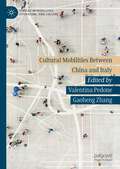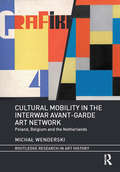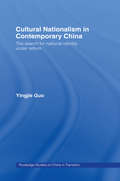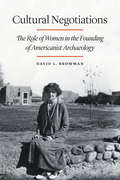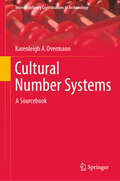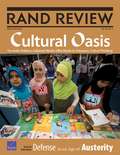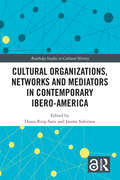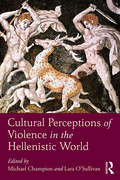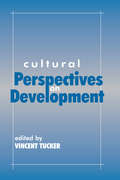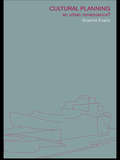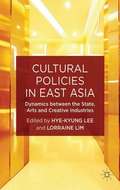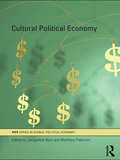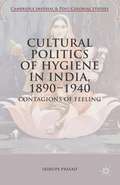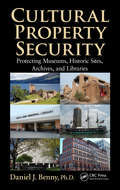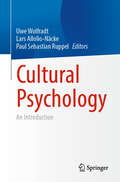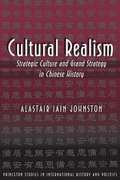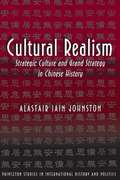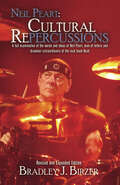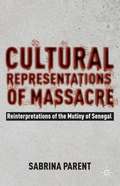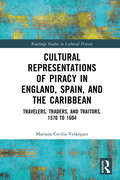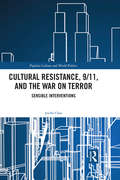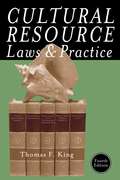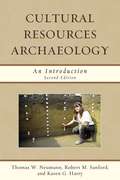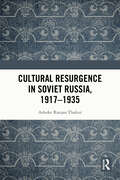- Table View
- List View
Cultural Mobilities Between China and Italy (Studies in Mobilities, Literature, and Culture)
by Gaoheng Zhang Valentina PedoneThis book offers a critical analysis of global mobilities across China and Italy in history. In three periods in the twentieth century, new patterns of physical mobilities and cultural contact were established between the two countries which were either novel at the time of their emergence or impactful on subsequent periods. The first two chapters provide overviews of writings by Italians in China and by Chinese in Italy in the twentieth century. The remaining chapters cover: Republican China’s relationships with Italy and Italian Fascist colonialism in China during the 1920s–1930s; Italian travelers to China during the Cold War from the 1950s to the 1970s; migrations between China and Italy during the 2000s–2010s. In analyzing these cultural mobilities, this book opens a new line of inquiry in Chinese-Italian Cultural Studies, which has been dominated by historical study, and contributes a significant case study to the scholarship on global cultural mobilities.
Cultural Mobility in the Interwar Avant-Garde Art Network: Poland, Belgium and the Netherlands (Routledge Research in Art History)
by Michał WenderskiThis book explores the issue of cultural mobility within the interwar network of the European avant-garde, focusing on selected writers, artists, architects, magazines and groups from Poland, Belgium and Netherlands. Regardless of their apparent linguistic, cultural and geographical remoteness, their mutual exchange and relationships were both deep and broad, and of great importance for the wider development of interwar avant-garde literature, art and architecture. This analysis is based on a vast research corpus encompassing original, often previously overlooked periodicals, publications and correspondence gathered from archives around the world.
Cultural Nationalism in Contemporary China: The Search For National Identity Under Reform (Routledge Studies on China in Transition)
by Yingjie GuoIn the vast majority of literature on 'Chinese nationalism' the distinction between nation and state is rarely made, consequently nationalism usually appears as loyalty to the state rather than identification with the nation. Yet, since 1989, both the official configuration of the nation and the state's monopolized right to name the nation have come under rigorous challenge. Cultural Nationalism in Contemporary China relocates the discussion of nationalism to within a more contemporary framework which explores the disjunction between the people and the state and the relationship of each to the nation.With its challenging exploration of one of the most neglected aspects of identity in China, this book should appeal to Asianists, China watchers and all of those with an interest in cultural and sociological phenomena in East Asia.
Cultural Negotiations: The Role of Women in the Founding of Americanist Archaeology (Critical Studies in the History of Anthropology)
by David L. BrowmanThis meticulously researched reference work documents the role of women who contributed to the development of Americanist archaeology from 1865 to 1940. Between the Civil War and World War II, many women went into anthropology and archaeology, fields that, at the beginning of this period, welcomed and made room for amateurs of both genders. But over time, the increasingly professional structure of these fields diminished or even obscured the contributions of women due to their lack of access to prestigious academic employment and publishing opportunities. As a result, a woman archaeologist during this period often published her research under her husband&’s name or as a junior author with her husband.In Cultural Negotiations archaeologist David L. Browman has scoured the archaeological literature and archival records of several institutions to bring the stories of more than two hundred women in Americanist archaeology to light through detailed biographies that discuss their contributions and publications. This work highlights how the social and cultural construction of archaeology as a field marginalized women and will serve as an invaluable reference to those researchers who continue to uncover the history of women in the sciences.
Cultural Number Systems: A Sourcebook (Interdisciplinary Contributions to Archaeology)
by Karenleigh A. OvermannThis sourcebook presents an extensive look at cultural number systems in numeracy and writing systems. Based on a decade of research by the author, the work examines topics such as why Xerxes the First counted his army by having his men march through an enclosure big enough to hold 10,000 of them at a time, why the Hawaiian word for "twenty" means “nine and two,” why an ancient Greek mathematician was driven mad by irrational numbers, and how old counting might be and how we might know this. Along the way, the author describes topics such as dactylonomy, the ancient art of expressing and calculating numbers with the fingers; specified counting, the use of different counting sequences to count different types of objects; and the ephemeral abacus, strategies for counting that involve people and goods but not an actual device. The chapters are organized into six geographical areas (the ancient Near East, Africa, Europe, Asia/India, Oceania, and the Americas).
Cultural Oasis: For Arab Children, Collected Works Offer Roads to Tolerance, Critical Thinking
by Jeffrey Martini Gail L. Zellman Laura S. Hamilton Michal Perlman Jennifer L. SteeleFeature stories discuss the promotion of tolerance and critical thinking in the Arab world through children's media, the challenges faced by the United States in an era of fiscal austerity, and promising models for measuring teacher performance. Two other stories highlight the National Science Foundation's role in promoting research in the United States and how RAND is helping several countries to foster technological innovation.
Cultural Organizations, Networks and Mediators in Contemporary Ibero-America (Routledge Studies in Cultural History #82)
by Diana Roig-Sanz Jaume SubiranaThis book proposes an innovative conceptual framework to explore cultural organizations at a multilateral level and cultural mediators as key figures in cultural and institutionalization processes. Specifically, it analyzes the role of Ibero-American mediators in the institutionalization of Hispanic and Lusophone cultures in the first half of the 20th century by means of two institutional networks: PEN (the non-governmental writer’s association) and the International Institute of Intellectual Cooperation (predecessor to UNESCO). Attempting to combine cultural and global history, sociology, and literary studies, the book uses an analytical focus on intercultural networks and cultural transfer to investigate the multiple activities and roles that these mediators and cultural organizations set in motion. Literature has traditionally studied major figures and important centers of cultural production, but other regions and localities also played a crucial role in the development of intellectual cooperation. This book reappraises the place of Ibero-America in international cultural relations and retrieves the lost history of key secondary actors. The book will appeal to scholars from international relations, global and cultural history, sociology, postcolonial Studies, world and comparative literature, and New Hispanisms.
Cultural Perceptions of Violence in the Hellenistic World
by Michael Champion Lara O'SullivanViolence had long been central to the experience of Hellenistic Greek cities and to their civic discourses. This volume asks how these discourses were shaped and how they functioned within the particular cultural constructs of the Hellenistic world. It was a period in which warfare became more professionalised, and wars increasingly ubiquitous. The period also saw major changes in political structures that led to political and cultural experimentation and transformation in which the political and cultural heritage of the classical city-state encountered the new political principles and cosmopolitan cultures of Hellenism. Finally, and in a similar way, it saw expanded opportunities for cultural transfer in cities through (re)constructions of urban space. Violence thus entered the city through external military and political shocks, as well as within emerging social hierarchies and civic institutions. Such factors also inflected economic activity, religious practices and rituals, and the artistic, literary and philosophical life of the polis.
Cultural Perspectives on Development (European Association Of Development Research And Training Institutes (eadi), Geneva, Book Ser.)
by Vincent TuckerWhat does cultural analysis have to offer development studies? Is culture a new paradigm for the study of development or a minefield of theoretical confusion? Can we move beyond notions of global culture' and local culture' to a more refined notion of cultural processes?This collection of articles addresses these issues providing a diversity of approaches. Two themes in particular run through the contributions: the relationship between culture and political economy and the relationship between local and global processes.
Cultural Planning: An Urban Renaissance?
by Graeme EvansUsing an historic and contemporary analysis, Cultural Planning examines how and why the cultures have been planned and the extent to which cultural amenities have been considered in town planning. From its ancient roots in the cities of classical Athenian, Roman and Byzantium empires, to the European Renaissance, public culture shows both an historic continuity and contemporary response to economic and social change. Whilst the arts are considered an extension of welfare provision and human rights, the creative industries and cultural tourism are also vital for economic growth and employment in the post-industrial age. However, the new 'Grand Projects', which look to the arts as an element of urban regeneration, tend to be at the cost of both local cultural amenities and a culturally diverse society.Cultural Planning is the first book on the planning of the arts and culture and the interaction between the state arts policy, the cultural economy and town and city planning. It uses case studies and examples from Europe, North America and Asia. The book calls for the adoption of consultative planning policy, distributive models and a more integrated approach to both culture and urban design, to prevent the reinforcement of existing geographical and cultural divides.
Cultural Policies In East Asia
by Hye-Kyung Lee Lorraine LimThis book provides an introduction to the contemporary issues that are occurring in cultural policy in East Asia today. Interest in East Asia has grown considerably in recent years due not only to the emergence of economic super-powers such as China but also to the cultural impact the region is making throughout the world through Japanese film and Korean Pop-Music. Addressing the relationship between the state, culture and the creative economy, this collection highlights how cultural policy within this region has to be understood within its social, historical and political context. By presenting a variety of chapters that examine the role of culture within the countries of China, Japan, Singapore, South Korea and Taiwan, this book offers readers an insight into the key issues affecting development of cultural policy in these countries. This book was originally published as a Special Issue of the International Journal of Cultural Policy.
Cultural Political Economy (RIPE Series in Global Political Economy)
by Jacqueline BestThe global political economy is inescapably cultural. Whether we talk about the economic dimensions of the "war on terror", the sub-prime crisis and its aftermath, or the ways in which new information technology has altered practices of production and consumption, it has become increasingly clear that these processes cannot be fully captured by the hyper-rational analysis of economists or the slogans of class conflict. This book argues that culture is a concept that can be used to develop more subtle and fruitful analyses of the dynamics and problems of the global political economy. Rediscovering the unacknowledged role of culture in the writings of classical political economists, the contributors to this volume reveal its central place in the historical evolution of post-war capitalism, exploring its continued role in contemporary economic processes that range from the commercialization of security practices to the development of ethical tourism. The book shows that culture plays a role in both constituting different forms of economic life and in shaping the diverse ways that capitalism has developed historically – from its earliest moments to its most recent challenges. Providing valuable insights to a wide range of disciplines, this volume will be of vital interest to students and scholars of International Political Economy, Cultural and Economic Geography and Sociology, and International Relations.
Cultural Politics and Resistance in the 21st Century
by Edited by Kara Z. Dellacioppa Clare Weber"Cultural Politics and Resistance in the 21st Century" demonstrates that twenty-first-century social struggles organize themselves around a distinct set of political discourses and practices. By analyzing the cases present in this volume, the editors develop important steps towards a theory of social change that can adequately address the complex realities and intersectionality of identity (race, gender, class, sexuality, nationality) within and among these new movements.
Cultural Politics of Hygiene in India, 1890-1940: Contagions of Feeling (Cambridge Imperial and Post-Colonial Studies Series)
by Srirupa PrasadThis book examines genealogies of contagion in between contagion as microbe and contagion as affect. It analyzes how and why hygiene became authoritative and succeeded in becoming a part of the broader social and cultural vocabulary within the colonialist, anti-colonial, as well as modernist discourses.
Cultural Property Security: Protecting Museums, Historic Sites, Archives, and Libraries
by Daniel J. BennyThe protection and security of cultural properties is of primary concern to the thousands of federal, state, county, city, and private institutions entrusted with housing and displaying our national heritage and history of our society. Cultural property security is of global importance as well, with tens of thousands of institutions internationally
Cultural Psychology: An Introduction
by Uwe Wolfradt Lars Allolio-Näcke Paul Sebastian RuppelThe introductory book presents the current state of cultural psychology in terms of theoretical approaches and methods comprehensively. It also demonstrates how deeply it is anchored in various fields of action. Cultural psychology is an interdisciplinary field of research that aims less to objectively and causally explain human behavior and experience, but rather seeks to understand psychological phenomena in their respective sociocultural context. In doing so, it follows a theoretical understanding of humans as actively acting beings. Compared to the prevailing nomothetic-oriented psychology, it emphasizes different theoretical and methodological approaches, particularly highlighting intentionality, meaning structuring, and ultimately the cultural aspects of human existence. Cultural psychology incorporates both hermeneutic approaches from psychology, philosophy, sociology, and ethnology, as well as qualitative methods for studying human behavior and experience.
Cultural Realism: Strategic Culture And Grand Strategy In Chinese History (Princeton Studies In International History And Politics Ser. #75)
by Alastair JohnstonCultural Realism is an in-depth study of premodern Chinese strategic thought that has important implications for contemporary international relations theory. In applying a Western theoretical debate to China, Iain Johnston advances rigorous procedures for testing for the existence and influence of "strategic culture." <p><p> Johnston sets out to answer two empirical questions. Is there a substantively consistent and temporally persistent Chinese strategic culture? If so, to what extent has it influenced China's approaches to security? The focus of his study is the Ming dynasty's grand strategy against the Mongols (1368-1644). First Johnston examines ancient military texts as sources of Chinese strategic culture, using cognitive mapping, symbolic analysis and congruence tests to determine whether there is a consistent grand strategic preference ranking across texts that constitutes a single strategic culture. Then he applies similar techniques to determine the effect of the strategic culture on the strategic preferences of the Ming decision makers. Finally, he assesses the effect of these preferences on Ming policies towards the Mongol "threat." <p><p> The findings of this book challenge dominant interpretations of traditional Chinese strategic thought. They suggest also that the roots of realpolitik are ideational and not predominantly structural. The results lead to the surprising conclusion that there may be, in fact, fewer cross-national differences in strategic culture than proponents of the "strategic culture" approach think.
Cultural Realism: Strategic Culture and Grand Strategy in Chinese History (Princeton Studies in International History and Politics #178)
by Alastair Iain JohnstonCultural Realism is an in-depth study of premodern Chinese strategic thought that has important implications for contemporary international relations theory. In applying a Western theoretical debate to China, Iain Johnston advances rigorous procedures for testing for the existence and influence of "strategic culture." Johnston sets out to answer two empirical questions. Is there a substantively consistent and temporally persistent Chinese strategic culture? If so, to what extent has it influenced China's approaches to security? The focus of his study is the Ming dynasty's grand strategy against the Mongols (1368-1644). First Johnston examines ancient military texts as sources of Chinese strategic culture, using cognitive mapping, symbolic analysis and congruence tests to determine whether there is a consistent grand strategic preference ranking across texts that constitutes a single strategic culture. Then he applies similar techniques to determine the effect of the strategic culture on the strategic preferences of the Ming decision makers. Finally, he assesses the effect of these preferences on Ming policies towards the Mongol "threat." The findings of this book challenge dominant interpretations of traditional Chinese strategic thought. They suggest also that the roots of realpolitik are ideational and not predominantly structural. The results lead to the surprising conclusion that there may be, in fact, fewer cross-national differences in strategic culture than proponents of the "strategic culture" approach think.
Cultural Repercussions: Cultural Repercussions
by Bradley J. BirzerA revised & expanded examination of the words and ideas of the man of letters and drummer extraordinaire of the rock band Rush. In January 2020, the world lost not only one of the greatest drummers, but also one of the most insightful lyricists. And a brilliant writer. Though Neil Peart was universally lauded as drummer for legendary rock band Rush, few studies have been devoted to his writings. Yet, Peart was very much a man of his words. He wrote lyrics, travelogues, essays, cultural criticism, short stories, and fantasy novels. The themes in his writings are timeless: personal journeys, exploration, excellence, growth, philosophy, art, satisfaction and happiness, religion, politics, individualism, natural history, life, love, loss, redemption, and beauty. Peart wanted every person to persevere through individual trials, find unique gifts and abilities and, ultimately, true happiness. He did not just profess such things; he lived them. Never satisfied with second best or any form of defeat, Peart challenged himself to live up to his own philosophy. And he always succeeded with grace, which earned him even more fervent admirers. Since his death in 2020, Neil Peart has continued to inspire thousands through his music, his words, and his example. This book—revised and expanded to incorporate Peart&’s final years—carefully examines the influence that his life, his witness, and his words have had on others. Neil Peart lived life to the fullest, and he made us each better for it. &“Includes some of the strongest analysis of Peart&’s lyrics that you&’ll find, and does a rigorous job of nailing down the tenets of Peart&’s ever-evolving philosophy.&” —PROG Magazine
Cultural Representations of Massacre
by Sabrina ParentIn this book, Parent puts together a history of representations of the 1944 mutiny in Senegal. Combining firsthand analysis of the works and their intertextual interactions as well an external perspective, Parent engages with history, literature, film, poetics, and politics and highlights the importance of remembering the past.
Cultural Representations of Piracy in England, Spain, and the Caribbean: Travelers, Traders, and Traitors, 1570 to 1604 (Routledge Studies in Cultural History)
by Mariana-Cecilia VelázquezThis book examines the concept of piracy as an instrument for the advancement of legal, economic, and political agendas associated with early modern imperial conflicts in the Caribbean. Drawing on historical accounts, literary texts, legal treatises, and maps, the book traces the visual and narrative representations of Sir Francis Drake, who serves as a case study to understand the various usages of the terms "pirate" and "corsair." Through a comparative analysis, the book considers the connotations of the categories related to maritime predation—pirate, corsair, buccaneer, and filibuster—and nationalistic and religious denominations—Lutheran, Catholic, heretic, Spaniard, English, and Creole—to argue that the flexible usage of these terms corresponds to unequal colonial and imperial relations and ideological struggles. The book chronologically records the process by which piracy changed from an unregulated phenomenon to becoming legally defined after the Treaty of London (1604) and the Treaty of Westphalia (1648). The research demonstrates that as piracy grew less ambiguous through legal and linguistic standardization, the concept of piracy lost its polemical utility. This interdisciplinary volume is ideal for researchers working in piracy studies, early modern history, and imperial history.
Cultural Resistance, 9/11, and the War on Terror: Sensible Interventions (Popular Culture and World Politics)
by Jenifer ChaoCultural Resistance, 9/11, and the War on Terror: Sensible Interventions offers a fresh account of the enduring cultural legacies of the September 11, 2001 terror attacks and the global war on terror through the critical lens of cultural resistance. It assesses the intersecting ways that popular culture has been deployed as oppositional practice in the post-9/11 context by documenting a collection of media texts, including a political hip hop album, a TV sitcom, a best-selling novel and studio photographs. Deviating from the conventional discursive and representative axis of mourning, nationalism and commemoration, this multimedia assemblage contests and rearticulates the political meanings, affects and visualizations of the war on terror and its global consequences. Drawing on the theoretical work of Jacques Rancière, the book also argues that these cultural artefacts are extending cultural resistance by shifting the scenes and methods of opposition to the realm of the sensible, or sensorial experiences. Never celebratory, the book encapsulates the potential of cultural practices against restricted post-9/11 regimes of visibility and audibility in the public sphere, but it also remains attentive to their blind spots, contradictions and constraints. This book offers a new angle to consider the events of 9/11, the war on terror and their continual effects, one that blurs established visions of patriotism and grief.
Cultural Resource Laws and Practice (Heritage Resource Management Series) (Fourth Edition)
by Thomas F. KingIn this fourth edition of the CRM classic, Thomas F. King shares his expertise in dealing with laws regulating the use of cultural resources. He explains the various federal, state, and local laws governing the protection of resources, how they have been interpreted, how they operate in practice, and even how they are sometimes in contradiction with each other.
Cultural Resources Archaeology: An Introduction (Second Edition)
by Thomas W. Neumann Robert M. Sanford Karen G. HarryMost students who pursue a career in archaeology will find employment in cultural resource management (CRM), rather than in academia or traditional fieldwork. It is CRM, the protection and preservation of archaeological and other resources, that offers the jobs and provides the funding. Few textbooks, however, are dedicated to teaching students the techniques and practices of this field. Cultural Resources Archaeology, now brought completely up date in this second edition and replete with new case studies from the western U.S., fills in the gap. Drawing on their decades of teaching and field experience, the authors walk students through the intricacies of CRM. They clearly describe the processes of designing a project, conducting assessment, testing, doing essential mitigation work (Phases I, II, and III), and preparing reports. The book's emphasis on real-world problems and issues, use of extensive examples from around the country, and practical advice on everything from law to logistics make it an ideal teaching tool for archaeology students who dream of becoming practicing archaeologists.
Cultural Resurgence in Soviet Russia, 1917–1935
by Ashoke Ranjan ThakurThis volume presents a new cultural history of the transformation of Russia to the Soviet Union. It looks at how the literature, the sciences and the arts played a key role in the emergence from a largely agrarian economy to world order. It traces the multiple revolutions that resulted in the overthrow of the Tsar’s regime during World War I; society, polity, cultural life and the economy saw major upheavals as the country went into turmoil following the War and the revolution. However, the volume highlights the continuities from the previous regime, as the communists built on the work done by their predecessors, including monarchists. Finally, the volume connects it to the larger currents in Europe and Asia at the time.The volume will be of great interest to scholars and students of modern Europe, history, social movements, and communism. It will also find interest among general readers.
